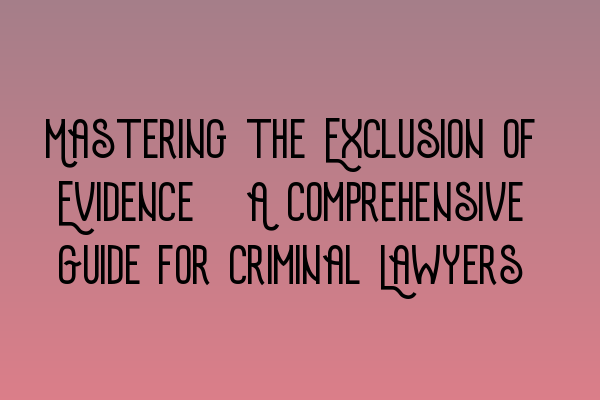Mastering the Exclusion of Evidence: A Comprehensive Guide for Criminal Lawyers
Welcome to SQE Criminal Law & Practice Law UK, where we provide valuable insights and guidance for aspiring solicitors and legal professionals. In today’s blog post, we will be diving deep into the topic of the exclusion of evidence in criminal cases. Understanding and mastering this aspect of criminal law is crucial for any criminal lawyer looking to excel in their practice.
The Significance of Excluding Evidence
Evidence is the lifeblood of any criminal case. It provides the foundation for building a strong defense or proving the prosecution’s case beyond a reasonable doubt. However, not all evidence is admissible in court. The exclusion of evidence serves as a safeguard against unfair trials and protects individuals’ rights under the law.
Knowing when and how to exclude evidence can mean the difference between a successful defense and a devastating loss. As a criminal lawyer, it is your duty to navigate the complex web of rules and precedents surrounding the exclusion of evidence. With this comprehensive guide, you will be equipped with the knowledge and strategies needed to effectively advocate for your clients.
Understanding the Grounds for Exclusion
There are various grounds on which evidence may be excluded in criminal cases. These include:
- Unlawful Search and Seizure: Evidence obtained through an illegal search or seizure is generally deemed inadmissible. Understanding the Fourth Amendment and its exceptions is essential in identifying violations of a defendant’s rights.
- Witness Credibility: Evidence that is unreliable or lacks credibility may be excluded to ensure a fair trial. Evaluating witness statements and challenging their credibility is a crucial skill for any criminal lawyer.
- Expert Opinions: Improperly qualified experts or opinions that lack scientific validity may be excluded. Understanding the admissibility criteria for expert testimony is vital in protecting your client’s interests.
- Hearsay: Statements made outside of court that are offered for the truth of the matter asserted are generally considered hearsay and are often excluded unless they fall under an exception. Familiarizing yourself with the various exceptions to the hearsay rule is crucial in not only excluding improper evidence but also admitting relevant hearsay.
Tactics for Excluding Evidence
Now that we have covered the grounds for exclusion, let’s explore some tactics that can be employed to effectively exclude evidence:
- Motion to Suppress: Filing a motion to suppress evidence obtained through an unlawful search and seizure can be a powerful tool in excluding crucial evidence from the trial.
- Evidentiary Objections: Knowing when and how to object to the presentation of evidence can lead to its exclusion. Familiarize yourself with the rules of evidence and develop a keen eye for spotting potential objections.
- Pretrial Motions: Proactively filing pretrial motions to exclude specific evidence can prevent its introduction during the trial. Thorough case analysis and research are essential in identifying potential evidentiary issues.
Stay Informed and Stay Ahead
At SQE Criminal Law & Practice Law UK, we are committed to helping you succeed as a criminal lawyer. Our comprehensive guide to mastering the exclusion of evidence is just one example of the valuable resources we provide. Make sure to check out these related articles to further enhance your knowledge and skills:
- SQE Exam Prep: Essential Study Materials for Aspiring Solicitors
- Demystifying the Solicitors Qualifying Examination Format
- SQE Exam for International Lawyers: Challenges and Success Strategies
- LLC Formation Made Simple: Step-by-Step Guide for UK Entrepreneurs
- LLC Formation: A Step-by-Step Guide for UK Entrepreneurs
By staying informed and continuously expanding your legal knowledge, you will be well-equipped to tackle the challenges of the courtroom and provide your clients with the best possible representation.
Thank you for reading this comprehensive guide. Be sure to check back regularly for more informative and insightful content from SQE Criminal Law & Practice Law UK.
